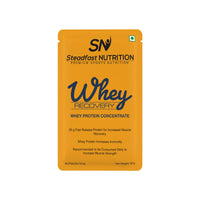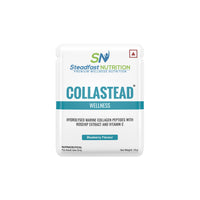Encouraging women's optimal health and well-being is crucial because of the distinct stages of life that they experience that call for special attention. These three phases include puberty, becoming pregnant, and, most importantly, growing older. Protein is crucial for women through all these life stages. Nutrition is among the most manageable ways to support women's health. A diet rich in high-quality protein is essential to support the growth and development of the body. One protein form women can easily incorporate into their diet is whey protein, which comes from cow's milk. It is an excellent source of protein for a healthy living.
Why is protein essential for women?
It's a well-known truth that women influence eating decisions significantly in their households. Not surprisingly, a woman who consumes enough protein may guarantee the protein needs of her entire family, helping to create a protein-sufficient India. However, when it comes to protein for women, they are mostly left behind, perceiving it might make them look bulked-up or give them a muscular physique.
Regardless of their stage of life, women need to consume protein consistently. Protein improves physical appearance and general health in numerous ways. Because keratin is made up of proteins, it is very beneficial for maintaining healthy skin, hair, and nails. But the benefits of protein don't end there - maintaining lean muscle mass also depends on taking an adequate amount of protein, which in no way suggests that women should want to be bodybuilders. Alternatively, ladies might have a more muscular and toned body and more physical strength by including protein in their regular diets. Furthermore, disorders like osteoporosis and bone loss, which disproportionately afflict women compared to men, may result from inadequate protein intake.
Benefits of Protein for Women
The daily recommended intake of protein varies in women, men, pregnant, and lactating women but the one thing that holds importance is that protein is essential for everyone, from babies to seniors, and both men and women. However, protein for women is not talked about very often. They don't get enough of it and usually miss out even the recommended daily values. It's essential to make sure you and other females in your life understand how vital protein is. It is imperative to know that it does more than just help with building muscles.
Boosts Immune System:
Neither men nor women like going through frequent sickness and illness. It sometimes can ruin the gains you earned after giving blood and sweat. A healthy immune system is necessary to function and maintain health, and both women and men need protein for this. If you pay heed to the consumption of protein, it will feel good to stave off the next cold and keep you motivated to work out. Many individuals consider that whey protein can take care of their body and it has also proven to be beneficial in strengthening the immune system.
A 2021 study published by the NCBI stated consuming more whey protein may strengthen the immune system's defences against antigen exposure and reduce the risk of illness.
Improves Bone Mineral Density:
Research suggests eating a diet high enough in protein will improve the health of your bones by lowering the risk of bone fractures as you age, which lowers the chance of osteoporosis characterised by a loss of bone density. Women are more prone to osteoporosis than men. Hence, they need to consume adequate protein.
A 2019 study published by NCBI backs the role between osteoporosis and consuming enough protein - it states that comprehensive review provides evidence that dietary protein intake beyond the current recommended daily allowance (RDA) of 0.8 g/kg body weight/day is associated with a lower incidence of hip fracture in older persons. Furthermore, there were positive trends for both femoral neck bone mineral density and total hip bone mineral density. However, when it comes to bone health, the body of evidence from the included research is not strong enough to recommend more protein for older persons compared to younger adults. Further research needs to be conducted for the same.
Supports Healthy Pregnancy:
During pregnancy, tissue needs to grow rapidly for the duration of nine months and as soon as women conceive. The majority of protein accretion during pregnancy (60%) is accounted for by maternal tissues, which include blood volume, extracellular fluids, and breast, uterine, and adipose tissues. The placenta, foetus, and amniotic fluid are where the remaining 40% of protein accretion takes place. To support tissue growth and development, maintain maternal homeostasis, and prepare for nursing, protein intake has to rise soon after conception. Hence, the benefits of protein in pregnancy are evident. The RDA values of protein for women during pregnancy are much higher than those of normal men and women.
Help Manage Body Weight:
Remember when your trainer said how strength training boosts muscle gain and how you spend calories even at rest when you indulge in strength training? Well, increased muscle mass increases resting calorie expenditure, which increases calorie expenditure even in the absence of physical activity. As a result, the ability of protein to stimulate muscle growth may increase your rate of burning calories, resulting in more significant weight loss.
A 2015 report published in the ‘American Journal of Clinical Nutrition’ found that while the long-term data on this topic may show some variability, there is a clear and consistent pattern indicating that sustained higher protein intake has a positive impact on either maintaining one's weight or preventing the regaining of lost weight.
Reduces Blood Pressure-
Many men and women suffer from hypertension (Increased Blood pressure), the factors include poor lifestyle, cardiovascular disruption, and more. However, whey protein (a good source of protein) can help reduce blood pressure.
A 2019 study published by the NCBI found whey protein consumption was associated with a significant decrease in systolic blood pressure (SBP) in people who were overweight or obese, pre-hypertensive, or had moderate hypertension. It was also discovered that whey protein improved endothelial function. It's important to remember that whey protein influences body weight and composition more than lipid profiles, inflammatory reactions, and antioxidant activity when it comes to controlling blood pressure. Buy Whey Protein.
Recommended Intake of Protein for Women
Protein, also known as the building block of life, is not only lacking in the Indian diet but also often overlooked. The Indian Council of Medical Research (ICMR) recommends 48 grams of protein per day, although the amount of protein consumed in India is far lower. While the recommended daily amount of protein for women and men (average adult) in Indians is 0.83 per kg per body weight, the average adult Indian consumes approximately 0.6 grams of protein per kilogram of body weight.
As per RDA for Indians- ICMR- NIN, 2020, the RDA value of adult women is 0.83gm per kg per body weight. However the RDA Value of Pregnant women is 0.83gm per kg per bodyweight + 9.5gm(2nd trimester) and 0.83gm per kg per bodyweight + 22gm(3rd trimester)
Protein Deficiency and its Symptoms
There are a lot of myths related to protein for women - a bulked-up physique being one; reducing protein intake leads to weight loss being another. A large chunk of women are protein deficient, which might become a sweet spot for many illnesses. Therefore, women must pay attention to their protein intake and keep an ideal check on signs of protein deficiency. Buy protein powder.
Common symptoms of protein deficiency in women:
1. Swollen feet-
Swelling, also known as oedema, is one of the most typical indicators that your body is not getting enough protein. This especially occurs in the hands, feet, legs, and abdomen. If your oedema is more severe and you'd like to get rid of it, make sure to consult your doctor.
2. Slow Wound healing-
Low protein levels in the body might hinder the healing process if you recently had surgery and are still recovering or sustained an injury from an accident or an extreme exercise regimen. Wounds take a long time to heal because it takes new cells a long time to regrow.
3. Decrease in Muscle Mass-
The maximum amount of protein stored in your body is found in the muscles. To preserve more vital tissues and bodily functions, the body may often extract protein from skeletal muscles when dietary protein is scarce. Therefore, over time, a deficiency in protein causes muscular atrophy. Muscle atrophy can result from even a mild protein deficiency, particularly in older adults.
4. Low Immunity-
One of the most important roles that protein plays in the body is bolstering the immune system. For the digestion and absorption of other nutrients that maintain your health, protein is essential. Thus, a low protein diet may be the cause if you tend to catch colds one after the other or are prone to infections and diseases. However, there may be other causes, such as a lack of any other essential nutrients—like zinc or vitamin D—that are required by our immune systems.
5. Hair fall-
Are you finding hair everywhere - on a comb, pillow, and sheets? Well, it can be a rooted sign of protein deficiency. Additional early indicators of low protein levels in the body include dry skin, thinning hair, and weak, brittle nails, which occurs as a result of the specific protein types—like keratin, collagen, and elastin—that make up our skin, hair, and nails. Therefore, deficiencies or excesses in protein might have an impact on our skin, hair, and nails.
Sources of Protein for Women
Some common sources of protein include eggs, chicken, beef, lentils, chickpeas, beans, seeds, cheese, milk, soy, milk, ham, yoghurt, oat flakes, fish, and whey protein.
In the end, let’s consider this: The marketing of whey protein supplements as tools to improve muscle growth and performance is prevalent among athletes and those who engage in regular physical activity. However, women and men with sedentary lifestyles also need to consider the importance of whey protein, considered a good source of protein for women. Whey protein can help you fulfil daily protein and if you are looking for the best protein powder for women, Whey Unflavoured from the house of Steadfast Nutrition can be your ideal pick. This protein for women provides 20 g of whey protein per serving sachet. The best part about this supplement is that it is free of any flavour, colour, or other food additives, making it a raw supplement that can be taken with water or milk.



